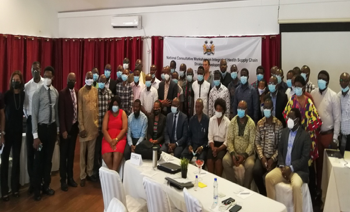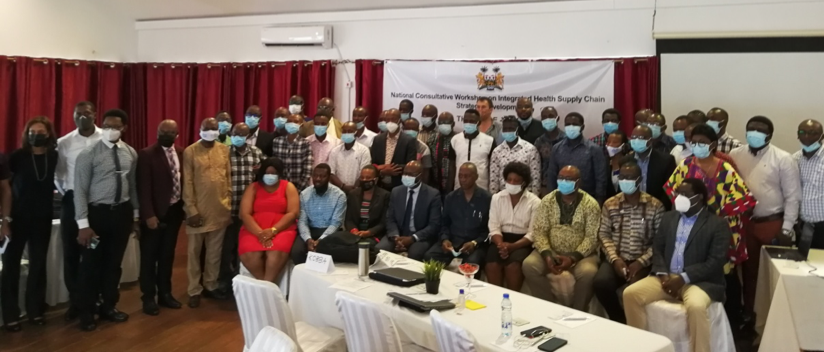
The United Nations Population Fund (UNFPA) has supported the Ministry of Health and Sanitation to develop a five-year National Supply Chain Strategic Plan, which is a strategy that will be a strategic document that provides a broader view of the current state of the supply chain, the strategic objectives of the Health Ministry and the roadmap for implementing high impact interventions for supply chain systems strengthening. A five-day stakeholders’ consultative workshop commenced on Monday 21st June 2021 at The Place Resort, Tokeh Beach, where participants are expected to put together a comprehensive five years Strategic Plan that will help guide investments and coordinate the efforts of all stakeholders involved in Sierra Leone’s health supply chain landscape.
It could be recalled that the Ministry of Health and Sanitation with support from UNFPA commenced the development of the Sierra Leone National Health Supply Chain Strategic Plan which was divided into two phases. Phase 1 was completed between 2nd September and 31st October 2021 and the resultant output was the Diagnostic Analysis of the current state of the National Supply Chain, highlighted key priority areas, and proffer recommends that should be addressed in the strategic planning process. Phase 2 was launched on the 25th February 2021 paving the way for the collection of the primary field data to further complete the Diagnostic Analysis and a deeper analysis of the key strategic areas identified in Phase 1

UNFPA’s Officer-In-Charge, Dr. Stephen Mupeta told the conference that his organization is proud to support the process because it is aware of the fact that most maternal and child mortalities in Sierra Leone can be prevented if quality and lifesaving medicines are available at all service delivery points. “A national integrated supply chain strategy should serve as a common framework for well-coordinated, well-aligned, and harmonized planning, implementation, performance monitoring, and reporting of supply chain interventions that ensure delivery of pharmaceuticals and health technology products to those in need. Such a common framework should also be used to structure and enhance existing multi-partner and multi-level financing and coordination mechanisms,” he said and furthered that Reproductive Health Commodity Security, whose key components will be integral to this national health supply chain strategy, plays a pivotal and strategic role in ensuring that Sierra Leone achieves its national health goals as enshrined in the Medium Term National Development Plan, the Sustainable Development Goals, and the International Conference on Population and Development (ICPD) commitments.
Dr. Mupeta said UNFPA appreciates the commitment of the government of Sierra Leone through the Ministry of Health and Sanitation to ensuring effective governance of the national supply chain system. “We urge you to ensure enhanced data management to inform effective planning and program implementation along the entire length of the supply chain system; rational medicines use, and strengthened coordination mechanisms as reflected in the National Health Sector Strategic Plan and the National Medicines Policy. I would like to assure you of UNFPA’s continued support,” he noted.
Chief Pharmacist in the Health Ministry, Jack Lansana disclosed that the strategy will form a framework and a roadmap to specifically guide the Ministry and other line sectors to reaffirm the health supply chain vision, goals, strategies, and means of achieving its desired outcomes within a specified period. “The strategy and its implementation plan will present a guideline for the priority areas over the next five years to all supply chain players in Sierra Leone,” he said and added that the consultative workshop will focus on the following areas: Describe the vision and mission of the national health supply chain strategic plan, aligned with national health sector plan; validate the findings on the current state of the health supply chain in Sierra Leone; define the strategic objectives for the national supply chain in the next 5 years; identify and prioritize the milestones and key interventions needed to achieve these objectives over the next 5 years; define the effective governance mechanism to monitor and manage the execution of the strategic plan; assess and address potential risks to the achievement of the strategic objectives and/or implementation of the milestones; and agree on the next steps to finalize the endorsement of the Integrated National Strategic Plan and the development of a costed Implementation Plan.
He admonished participants to remain focused and committed to making these five days stakeholder consultative workshop a success.
Philip Wambua who represented the Foreign, Commonwealth, and Development Office (FCDO) described the supply chain in the health sector as very important to address various conditions and furthered that some widely discussed medical conditions like blood should be factored in the strategy. “I hope that this will be an evidence-based strategy”’ he said and recommended that the strategy addresses efficiency, data use for decision-making and it should be a strategy that builds national structures. He admonished stakeholders that the strategic plan is implemented and should also ensure that there are milestones to increase implementation and also a structure for accountability.



